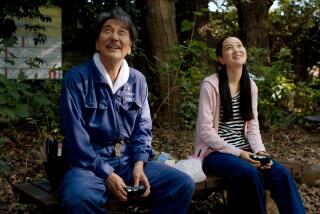Suzuki’s Award-Winning ‘Zigeunerweisen’ Dazzles
- Share via
When director Seijun Suzuki’s long association with Nikkatsu Studios (and its commercial restraints) were at last behind him, Suzuki went all out for art for art’s sake with the utterly amazing, highly challenging and thoroughly dazzling 1980 “Zigeunerweisen,” screening Tuesday at 5:15 and 9:45 p.m. at the Nuart as part of Film-forum’s weeklong Suzuki retrospective.
Taking its title from a piece of Gypsy violin music, it is set in a beautiful rural region of Japan in the ‘20s and is a fable verging on the supernatural that deals with the shifting interplay between two men and three women. The men are friends, one a handsome wanderer, Nakasago (Yoshio Harada), the other, Aochi (Toshiya Fujita), a brooding professor of German literature.
Nakasago marries an uninhibited flapper (Naoko Otani), complete with a Louise Brooks/Colleen Moore Dutch bob, while Aochi takes a traditional-seeming wife (Kisako Mikashi). The third woman is an ex-geisha who figures in the story’s beginning and ending.
There’s a great deal of role-playing and role-exchanging plus a consideration of the relationship between death and desire, the blurring of the line between life and death and the impact of the West upon Japanese culture.
Most remarkably, this beautiful, eerie and erotic tale evokes, way beyond sexual desire, the ceaseless tug within us between the need to preserve our sense of self and our longing to bond with another to break through that pervasive sense of isolation that seems such an inescapable aspect of being alive. No doubt about it, “Zigeunerweisen” is a major work. It was voted the best Japanese film of the ‘80s by Japanese critics. Information: (310) 478-6379.
‘Zigeunerweisen’ is a fable verging on the supernatural.
More to Read
Only good movies
Get the Indie Focus newsletter, Mark Olsen's weekly guide to the world of cinema.
You may occasionally receive promotional content from the Los Angeles Times.










